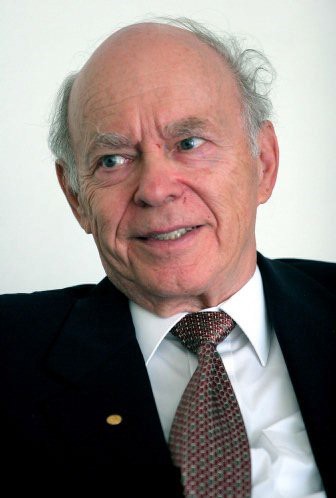
Irwin (Ernie) Allan Rose
Distinguished Researcher in Residence of Physiology & Biophysics
UC Irvine professor Irwin (Ernie) Rose was born on July 16, 1926 in Brooklyn, NY and passed away during his sleep in Deerfield, Massachusetts in the early hours of June 2, 2015. He was 88 years old. Dr. Rose, a biochemist by training, was a world renowned enzymologist specializing in mechanisms of enzyme action. In 2004, he shared the Nobel Prize in chemistry with Aaron Ciechanover and Avram Hershko of the Israel Institute of Technology for discovering a way that cells destroy unwanted proteins – the basis for developing new therapies for diseases such as cervical cancer and cystic fibrosis.
Ernie Rose grew up in NY but spent his teen years in Washington State. He attended Washington State College and the University of Chicago, earning both his undergraduate and graduate degrees from the latter institution. After post-doctoral work at Case Western and New York University, he joined the faculty of the biochemistry department of the Yale School of Medicine in 1954, where he met his wife, Zelda Budenstein, a graduate student who also became a research scientist. In 1963, the Roses moved to the Fox Chase Cancer Center in Philadelphia, where he performed the majority of his widely recognized work that ultimately fostered a new understanding of the molecular activity involved with cancer and other diseases leading to his Nobel-prize winning research. Dr. Rose became a member of the National Academy of Sciences in 1979. After retiring from Fox-Chase, he joined the Department of Physiology & Biophysics at UC Irvine as a Distinguished Professor-in-Residence in 1997, where he shared lab space with his good friend and colleague, Professor Emeritus Ralph A. Bradshaw, then a professor in the department.
At UCI, Dr. Rose was known for maintaining a rigorous routine, working in the lab three to four times a week and publishing, on average, one research paper a year on a project that reflected his old love of enzyme mechanisms. Dr. Bradshaw remembers Dr. Rose as a beloved colleague and mentor to both students and faculty. He became UCI's third Nobel Laureate (chemistry). Dr. Bradshaw says Dr. Rose was "a joy to have in the lab because both prior to and after winning the Nobel Prize, he would help any student or young postdoctoral researcher who was having a hard time with an experiment. He would sit with them and try to figure out what was going wrong." Dr. Rose, a consummate scientist, was described by friends and colleagues as humble, generous, and endlessly curious. Colleagues also described him as modest, unpretentious, and devoted to his work. Besides his sons Howard and Frederic, Dr. Rose is survived by his wife, Zelda; another son Robert; and five grandchildren. A daughter, Sarah died in 2005. It is difficult to estimate how many students and scientists were educated and influenced by Dr. Rose but it was a very significant number. He was, and is, highly respected and appreciated for his love of science and his desire to impart this to future generations.
Ralph A. Bradshaw
Professor Emeritus of Physiology & Biophysics
Michael D. Cahalan
Distinguished Professor and Department Chair of Physiology & Biophysics
